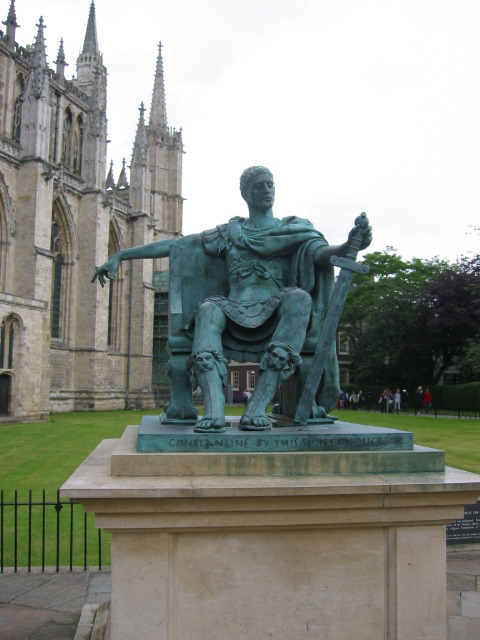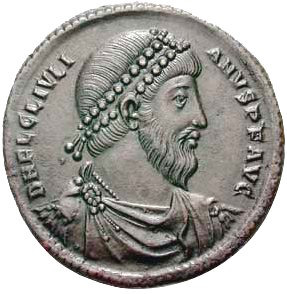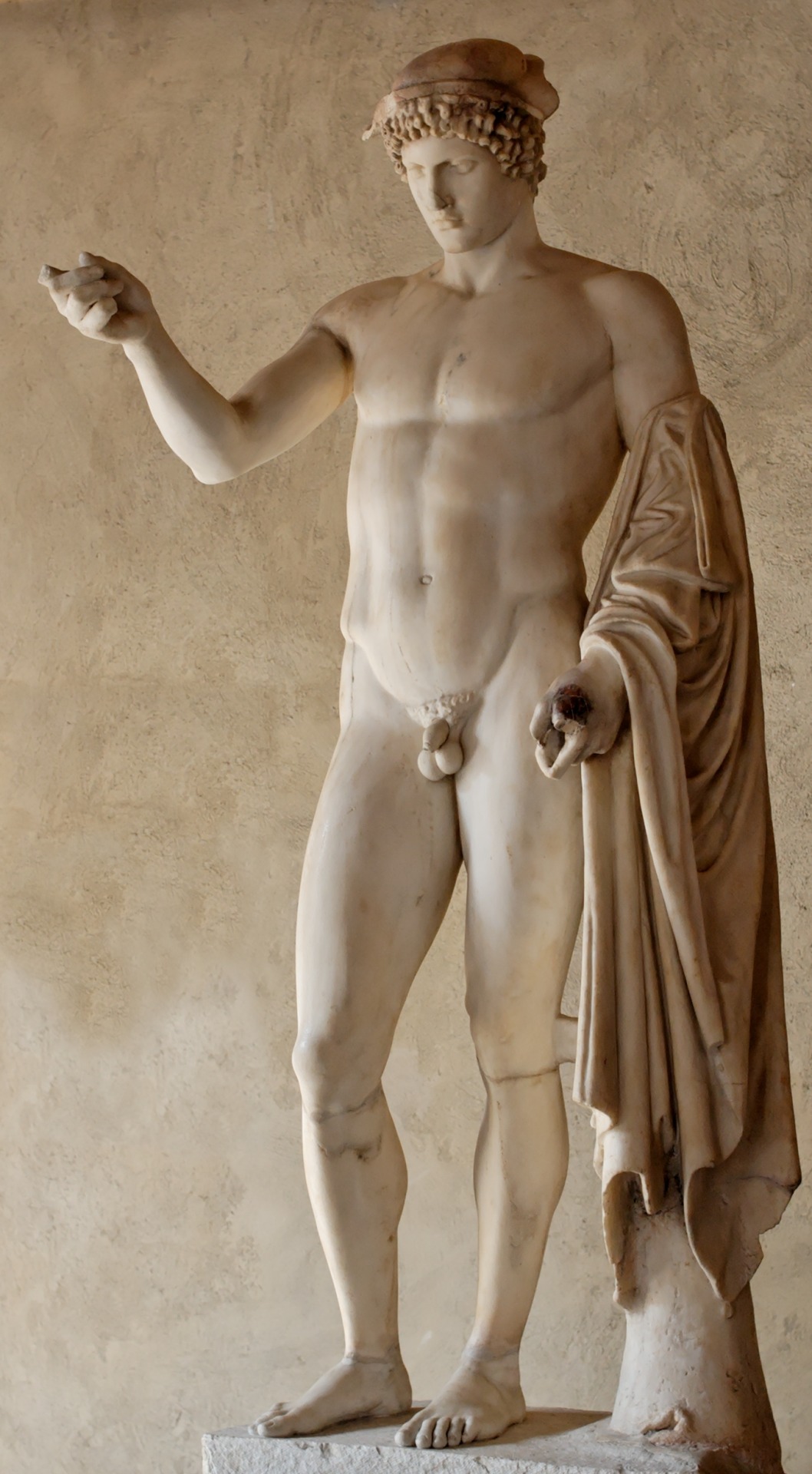#Mercurius Orator
Explore tagged Tumblr posts
Text
Eugenius III and Julian
So I had an idea for meta-stuff involving Eugenius III, my ace atheist version of a Legendary King of Scotland.
Now in Medieval Histories they had a habit of playing around with the history, giving mythologised versions of historical figures, adding local legends. In one such myth Constantine's mother was the daughter of British King Coel, who married Constantius. In reality she might have just been a stable-maid and there is some debate over the nature of her relationship with Constantine's father, may not have even been married fully... in any case they seem to have divorced as Constantius needed wife better for his status.
So, Constantine is big figure in the Matter of Britain, the second British King to become ruler of Rome, the first being Brennius, brother of Belinus. The third was Arthur, keeping to prophecy stuff. Constantine was first proclaimed Emperor in York, Britain, in 306 on his father’s death.

So. Julian was Constantine’s nephew, the last of the dynasty, son of Julius Constantius, one of Constantine’s half-brothers. On Constantine’s death in 337 he was a victim of the purges with his eldest son, though Julian, a child at the time, was spared, having been born in 331.
Finally of Constantine’s sons just Constantius II was left. In 360 Julian’s troops proclaimed him Emperor in Paris, leading to a civil war with his cousin... who died in 361, naming Julian his successor.

Julian was the last Pagan Roman Emperor, trying to restore Paganism, or his own branch of theology. He was married to his first cousin Helena, daughter of Constantine. However their marriage was childless, there were apparently some miscarriages and by the time her husband became Emperor she seems to have died.
Julian died in 363 while campaigning in Persia, allegedly Saint Mercurius killed him, according to vision by Saint Basil. His successors were Christian and finally the Edict of Thessalonica in 380 AD by Emperor Theodosius made Christianity the state religion.
So. Fitting in with Medieval mythologising of history I imagine Eugenius seeing some sort of... play or account where Julian is a scheming malcontent-type who plots his uncle’s death in order to seize power. Maybe lusts after his cousin, hoping to marry her to enhance his claim, before rebelling against his cousin. And Julian says how much he hates Christianity and how he wishes to return the Empire to Paganism.
Eugenius sees this as an attack on him, considering it’s kind of an open secret he had his uncle Goranus murdered. And Eugenius is a sort of antitheistic Epicurean, even if officially in the closet about it.
So he tries to write a piece on Julian himself and his tutor points out he's just done basically the same thing, having Julian spend ages bashing Christianity and that Julian wasn’t even Epicurean really. Julian belonged to a rather obscure branch of philosophy that seemed to believe in blood-worship. As I found out in my Later Roman Empire course at University, part of the problem was that Julian was pushing a strange and minority interpretation of religion which barely anyone could understand so it couldn’t really take off.
And then his tutor says he's obsessing over writing a self-insert historical piece when he has more important things to do anyway.
Also in another little touch Eugenius might write Julian as uninterested in women and gets asked if that was really backed up by any proper evidence. Julian had no children but that’s about it. There are ideas his lack of children might have had deliberate reasons.
Going from the Wikipedia page on Helena:
The "Funeral Oration upon the Emperor Julian" by Libanius elaborates on the subject of Julian's chastity: "This was the pleasure our emperor reaped from the length of the nights, whilst others were following the business of Venus. But he was so far from inquiring where there was a fair daughter, or wife, that had he not once been tied by Juno with the bond of marriage, he would have ended his days knowing nothing of sexual intercourse but by name. But as it was he regretted his wife, yet did not touch another woman, either before or after her; being by his constitution enabled to be continent, and his constant occupation in the art of soothsaying concurring to require this restraint. ... Being exhorted by his relations to marry, that he might get children for heirs to his power, "It was out of fear of this very thing," replied he, "that I have neglected to do so, lest they, succeeding by hereditary right, should turn out bad and ruin the state, experiencing the same fate with Phaethon." Thus did he regard his own want of children as a lighter calamity than the chance of mischief to the provinces." This is from Libanius, "Funeral Oration upon the Emperor Julian". 1888 translation.
But Eugenius wants to push Julian into his ideas of good kingship and tries to push him as having similar orientation to him. Considering his distrust of religion I imagine he’d really dislike Constantine for bringing Christianity to the Empire and would favour Julian for trying to reverse his uncle’s decision. Might allude to Edward Gibbon’s end in The History of the Decline and Fall of the Roman Empire that Christianity weakened the Empire by making the people less concerned about their life now.
Yet ultimately he is ending up doing the same thing, forcing a kind of inaccurate portrait of Julian to favour his ideas.
Of course you can see a meta-commentary with what author is doing with Eugenius III. Eugenius himself is hugely anachronistic in his ideas. But it’s Arthuriana, it’s supposed to be anachronistic anyway.
Just a fun thought.
I’m not sure what Eugenius writes his Julian as. Could be like a play, not unlike Julian writing his piece The Caesars, where he mocks Christianity and his uncle as they arrive among the Gods. Or could be history. Or could be fictionalised autobiography of Julian.
He might say no-one would believe this was written by Julian, saying it would be like if Claudius wrote a history of his life which was buried in Britain, hinting at a famous work. Might allude to Gore Vidal’s Julian as well, which was criticized by historian Robert Browning for crediting its subject with sexual exploits for which there is no evidence.
@hiddenhistoryofwesteros @cukibola @epic-summaries
#julian the apostate#eugenius iii#matter of britain#matter of scotland#arthuriana#my arthuriana#constantine#atheism#asexuality
9 notes
·
View notes
Text


~100-150, (Auctor incertus), Λόγιος Ερμής (Hermes Logios)
Fontes: Marie-Lan Nguyen & Jastrow
#Auctor incertus#Hermes Orator#Mercurius Orator#Hermes Logios#Λόγιος Ερμής#saec. II#saec. V a.Ch.n.#100#150#400 a.Ch.n.#450 a.Ch.n.#sculptura#Museo Nazionale Romano#Palazzo Altemps#Romae#Mercurius#Hermes#Orator#15FNAT0
40 notes
·
View notes